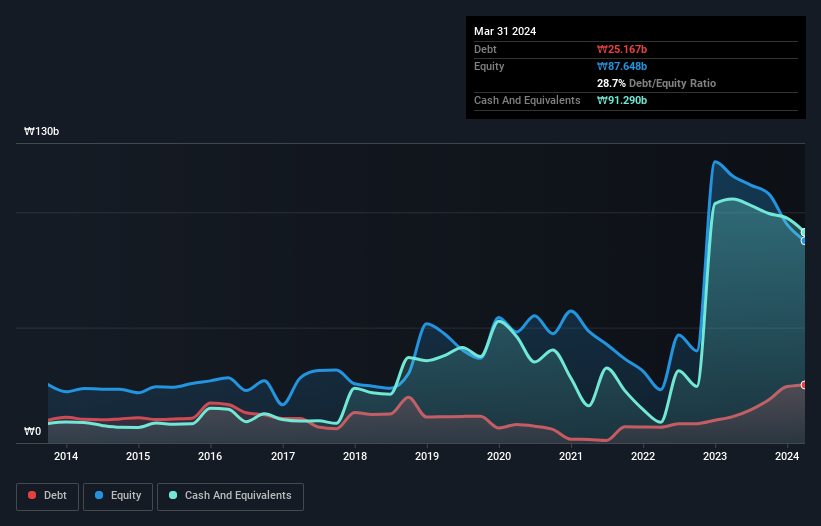- South Korea
- /
- Pharma
- /
- KOSDAQ:A039200
Oscotec (KOSDAQ:039200) Has Debt But No Earnings; Should You Worry?
Howard Marks put it nicely when he said that, rather than worrying about share price volatility, 'The possibility of permanent loss is the risk I worry about... and every practical investor I know worries about.' When we think about how risky a company is, we always like to look at its use of debt, since debt overload can lead to ruin. We note that Oscotec Inc. (KOSDAQ:039200) does have debt on its balance sheet. But should shareholders be worried about its use of debt?
When Is Debt Dangerous?
Generally speaking, debt only becomes a real problem when a company can't easily pay it off, either by raising capital or with its own cash flow. Ultimately, if the company can't fulfill its legal obligations to repay debt, shareholders could walk away with nothing. While that is not too common, we often do see indebted companies permanently diluting shareholders because lenders force them to raise capital at a distressed price. Having said that, the most common situation is where a company manages its debt reasonably well - and to its own advantage. When we examine debt levels, we first consider both cash and debt levels, together.
See our latest analysis for Oscotec
What Is Oscotec's Debt?
You can click the graphic below for the historical numbers, but it shows that as of March 2024 Oscotec had ₩25.2b of debt, an increase on ₩11.4b, over one year. But it also has ₩91.3b in cash to offset that, meaning it has ₩66.1b net cash.

A Look At Oscotec's Liabilities
We can see from the most recent balance sheet that Oscotec had liabilities of ₩34.9b falling due within a year, and liabilities of ₩3.16b due beyond that. Offsetting these obligations, it had cash of ₩91.3b as well as receivables valued at ₩680.7m due within 12 months. So it can boast ₩53.9b more liquid assets than total liabilities.
This surplus suggests that Oscotec has a conservative balance sheet, and could probably eliminate its debt without much difficulty. Simply put, the fact that Oscotec has more cash than debt is arguably a good indication that it can manage its debt safely. There's no doubt that we learn most about debt from the balance sheet. But ultimately the future profitability of the business will decide if Oscotec can strengthen its balance sheet over time. So if you want to see what the professionals think, you might find this free report on analyst profit forecasts to be interesting.
In the last year Oscotec had a loss before interest and tax, and actually shrunk its revenue by 6.1%, to ₩4.9b. We would much prefer see growth.
So How Risky Is Oscotec?
Statistically speaking companies that lose money are riskier than those that make money. And in the last year Oscotec had an earnings before interest and tax (EBIT) loss, truth be told. Indeed, in that time it burnt through ₩24b of cash and made a loss of ₩24b. While this does make the company a bit risky, it's important to remember it has net cash of ₩66.1b. That means it could keep spending at its current rate for more than two years. Overall, its balance sheet doesn't seem overly risky, at the moment, but we're always cautious until we see the positive free cash flow. There's no doubt that we learn most about debt from the balance sheet. However, not all investment risk resides within the balance sheet - far from it. These risks can be hard to spot. Every company has them, and we've spotted 3 warning signs for Oscotec (of which 1 is significant!) you should know about.
At the end of the day, it's often better to focus on companies that are free from net debt. You can access our special list of such companies (all with a track record of profit growth). It's free.
New: AI Stock Screener & Alerts
Our new AI Stock Screener scans the market every day to uncover opportunities.
• Dividend Powerhouses (3%+ Yield)
• Undervalued Small Caps with Insider Buying
• High growth Tech and AI Companies
Or build your own from over 50 metrics.
Have feedback on this article? Concerned about the content? Get in touch with us directly. Alternatively, email editorial-team (at) simplywallst.com.
This article by Simply Wall St is general in nature. We provide commentary based on historical data and analyst forecasts only using an unbiased methodology and our articles are not intended to be financial advice. It does not constitute a recommendation to buy or sell any stock, and does not take account of your objectives, or your financial situation. We aim to bring you long-term focused analysis driven by fundamental data. Note that our analysis may not factor in the latest price-sensitive company announcements or qualitative material. Simply Wall St has no position in any stocks mentioned.
Have feedback on this article? Concerned about the content? Get in touch with us directly. Alternatively, email editorial-team@simplywallst.com
About KOSDAQ:A039200
Oscotec
Operates as a biotechnology company, engages in the drug development, functional materials and related products, and dental bone graft material businesses.
Exceptional growth potential with excellent balance sheet.
Market Insights
Community Narratives



